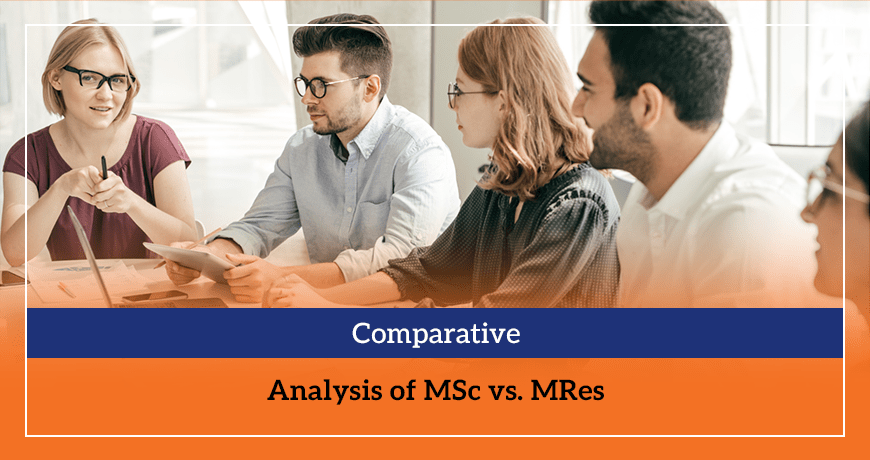A bachelor's degree is no longer enough to set yourself apart in today's competitive world. A Master's degree can be the key to unlocking exciting career opportunities and propelling you towards your academic goals. But with a variety of Master's programs available, choosing the right one can be daunting.
This write-up scrabbles into the differences between master of research vs master of science. We'll explore the distinct focus of each program, helping you decide which path best aligns with your aspirations, whether you seek in-depth knowledge in a specific field or a springboard for a research-driven career. So, let’s get started.
Overview of Degree Programs
Master of Science (MSc)
An MSc program provides advanced knowledge and specialized skills in a particular scientific field. It equips graduates with the expertise to excel in professional settings or pursue further research in their chosen discipline. MSc programs encompass various scientific fields, including Engineering, Computer Science, Biology, Physics, Chemistry, and Mathematics.
An MSc typically blends coursework, workshops, and a final thesis project. Coursework provides a strong foundation in core subjects and emerging trends. Workshops offer practical training in research methods, data analysis, and communication skills. The thesis allows students to delve into a specific research topic under the guidance of a supervisor, culminating in a written dissertation.
MSc programs generally last one to two years full-time, with part-time options available. Evaluation methods vary but often include a combination of exams, coursework assessments, presentations, and the final thesis defence.
Master of Research (MRes)
An MRes program emphasizes independent research skills and prepares students for doctoral studies. It offers a more research-intensive experience compared to an MSc.
MRes programs heavily focus on independent research. While some coursework might be included, most of the program involves conducting research projects under the supervision of a faculty member. Students typically complete one or two substantial research projects culminating in a dissertation or research paper.
The MRes is an excellent stepping stone for those aiming for a PhD. It provides the necessary research skills, experience, and often a publishable research project – all valuable assets for PhD applications.

Comparative Analysis of MSc vs. MRes
Curriculum Focus
- MSc: Leans towards taught courses. Students gain a broad knowledge base through in-depth lectures, seminars, and workshops. Coursework often covers advanced topics alongside practical skills in research methods and data analysis.
- MRes: Takes a research-oriented approach. The majority of the program involves conducting independent research projects under faculty supervision. There might be a few specialized courses to supplement research skills, but the focus is on developing robust research methodology and execution.
Assessment Methods
- MSc: Relies on a combination of coursework assessments, exams, presentations, and the final thesis defence. Exams test knowledge gained from lectures, while coursework assessments evaluate understanding concepts through assignments, projects, or quizzes. Presentations hone communication skills, and the thesis defence allows students to showcase their research findings and critical thinking.
- MRes: Primarily assesses through the thesis or research paper and potentially through presentations. The final research project is the main focus, demonstrating a student's ability to formulate a research question, conduct independent research, analyze data, and draw conclusions. Presentations might be used to showcase research progress or defend the final project.
Career Implications
- MSc: Geared towards preparing graduates for industry careers. The program equips students with a strong understanding of the field alongside practical skills. Graduates are well-positioned for roles in research and development, technical fields, and specialist positions within their chosen discipline.
- MRes: Ideally suited for those aiming for a research-focused career in academia. The program fosters the necessary skills and experience for doctoral studies. The research project can also lead to publications, which strengthen PhD applications. MRes graduates might also find research assistant positions in universities or research institutions.

Admission Requirements and Application Process
Common Prerequisites
- Bachelor's Degree: Both programs necessitate a bachelor's degree in a relevant field, typically with a good grade point average (GPA). Specific GPA requirements vary by program and university, so consult their websites for details.
- English Language Proficiency: If English is not your native language, you'll likely need to submit proof of proficiency through standardized tests like TOEFL or IELTS. The required minimum score will also depend on the university's guidelines.
- Academic References: Strong academic references from professors or your superior who can vouch for your academic abilities, research potential, and work ethic are crucial for both MSc and MRes applications.
Application Process
- Documents: Prepare all necessary documents, including official transcripts that showcase your academic performance, degree certificates as proof of your bachelor's qualification, a well-crafted curriculum vitae (CV) or resume highlighting your relevant skills and experience, a compelling personal statement outlining your motivations, career goals, and research interests, and recommendation letters from teachers or professors who can speak to your academic aptitude and potential for success at the postgraduate level.
- Proposals (MRes only): You might be required to submit a research proposal for MRes programs. This document is an essential element of your application, demonstrating your ability to formulate a clear research question, propose a feasible methodology that aligns with available resources and ethical considerations, and articulate expected outcomes.
- Interviews: Some programs may conduct interviews to evaluate your suitability for the program and delve deeper into your research interests. It is an opportunity to showcase your passion for the field, articulate your research questions clearly and concisely, and demonstrate your ability to think critically and engage in academic discussions.
Tips for a Successful Application
MSc
- Highlight relevant coursework and achievements: In your personal statement, showcase the specific coursework, projects, or laboratory experiences from your undergraduate studies that align with the chosen MSc program. Demonstrate a strong foundation in the core concepts and highlight any academic achievements that showcase your potential for success at the postgraduate level.
- Research experience is a plus: If you have gained research experience through internships, projects, or participation in faculty research labs, highlight these experiences in your application, as it will show your ability to apply theoretical knowledge to practical research problems and showcase your research skills.
- Customize your application: Take the time to customize your application materials to the specific MSc program you're interested in. Research the program's curriculum, faculty expertise, and research focus areas. Demonstrate your knowledge of the field and how your interests align with the program's specific offerings.
MRes
- Develop a strong research proposal: The research proposal is a cornerstone of your MRes application. Invest time crafting a well-structured document outlining your proposed research topic, methodology, and expected outcomes. Ensure your research question is clearly defined, feasible within the program's timeframe and resources, and ethically sound.
- Contact potential supervisors: Proactively contact faculty members whose research expertise aligns with your proposed topic. Discuss your interests and gauge their potential interest in supervising your research. It demonstrates initiative and allows you to benefit from the supervisor's guidance in refining your research proposal.
- Showcase research skills and passion: In your personal statement, focus on showcasing your research skills, critical thinking abilities, and passion for independent learning. Highlight any research experiences you've had and how they fueled your interest in pursuing further research in this specific field.

Costs and Funding Options
Tuition Fees
- MSc: The tuition fees for MSc programs vary greatly depending on the university, program, and location. Generally, they fall within a wider range compared to MRes programs.
- MRes: MRes programs often have more standardized tuition fees across universities within a country. However, depending on the specific program and institution, some variation might still exist.
Financial Aid
Several avenues can help ease the financial burden of postgraduate studies. The following are some common funding options that you can consider:
- Scholarships: Many universities and external organizations offer scholarships specifically for postgraduate programs. These scholarships can be merit-based, need-based, or targeted towards specific research areas.
- Grants: Similar to scholarships, Grants are financial awards that don't require repayment. Research institutions, government agencies, or private foundations might offer them.
- Loans: Government-backed student loans are available in some countries to help finance postgraduate studies. These loans typically have lower interest rates than private loans but require repayment after graduation. Carefully evaluate different loan options and ensure you understand the repayment terms before committing.
Budgeting Tips
- Factor in living expenses, including accommodation, food, etc., and tuition fees.
- Prioritize scholarships and grants to minimize loan reliance.
- Explore part-time work if permitted by your visa and program schedule.
- Meet financial aid deadlines to ensure you're considered for available funding.
Pros and Cons of Each Program
Master of Science (MSc)
Pros:
- Broad Knowledge Base: Provides a comprehensive understanding of your chosen field, covering advanced topics alongside practical skills. This versatility makes graduates well-rounded candidates for a variety of industry positions.
- Immediate Industry Applicability: The program's focus on practical skills and coursework equips graduates with the knowledge and tools to excel in industry roles.
Cons:
- Less Focus on Extensive Research Skills: The emphasis on coursework might limit opportunities to develop in-depth research skills compared to an MRes program.
Master of Research (MRes)
Pros:
- Deep Research Training: Provides intensive training in research methods, data analysis, and critical thinking – valuable skills for a research career.
- Preparation for PhD: The program structure prepares students for the rigours of doctoral studies, making them strong applicants for PhD programs.
Cons:
- Less Coursework: There might be limited coursework compared to an MSc, potentially leaving some students with gaps in their knowledge base outside their specific research area.
- Requires More Self-Motivation: The independent research nature of the program demands a high degree of self-motivation, time management skills, and the ability to work independently.
Conclusion
Master of Research vs Master of Science are distinctive postgraduate pathways catering to two aspirations. Ultimately, the right program hinges on your individual goals. So, carefully consider your preferred learning style, desired career trajectory, and research interests to make an informed decision that propels you towards academic and professional success.